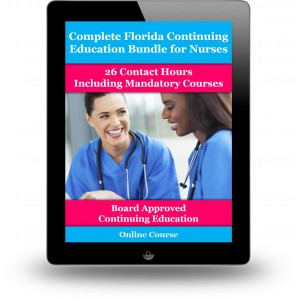- Home
- About Us
- CE Accreditation
-
CE Courses
- Nursing CE Courses
- Advanced Nursing Practice
- Critical Care Nursing
- Disaster and Terrorism Management
- Emergency Nursing
- Ethics, Legal and Advocacy
- Infection Control and Community Nursing
- Gerontology
- Leadership and Management
- Medical-Surgical Nursing
- Nursing Sciences
- Nursing Skills and Procedures
- Pediatric Nursing
- Perioperative Nursing
- Pharmacology
- Psychiatric / Mental Health
- State-Required Courses
- Teaching and Preceptorship
- CE Course Bundles
- Medical CME Courses
- Inservice Courses
- Nursing CE Courses
- CE Certification
- FAQ
- Contact Us
Details
Pharmacological Treatment of Diabetes Mellitus is a comprehensive review of current pharmacologic strategies used in the management of both Type 1 and Type 2 diabetes. This course is designed to enhance clinical decision-making by providing a thorough understanding of antidiabetic drug classes, mechanisms of action, patient-specific considerations, and the role of combination therapies in optimizing glycemic control.
The curriculum focuses on the therapeutic goals of diabetes pharmacotherapy, including glycemic targets, cardiovascular risk reduction, renal protection, and minimization of adverse effects such as hypoglycemia. The course also explores medication selection based on patient comorbidities, lifestyle factors, and disease progression. In addition, key elements of patient education, adherence, and monitoring are addressed in the context of improving long-term outcomes.
Topics covered include:
- Overview of Diabetes Mellitus: Pathophysiology of Type 1 and Type 2 diabetes, disease progression, and complications.
- Pharmacologic Classes and Mechanisms: Detailed review of insulin therapy, biguanides, sulfonylureas, SGLT2 inhibitors, GLP-1 receptor agonists, DPP-4 inhibitors, thiazolidinediones, and others.
- Insulin Therapy: Basal-bolus regimens, insulin types, titration strategies, and use in both Type 1 diabetes and advanced Type 2 diabetes.
- Non-Insulin Therapies: Indications, contraindications, and evidence supporting the use of oral and injectable agents in various patient populations.
- Treatment Algorithms and Guidelines: ADA and AACE treatment pathways for initial therapy and intensification, including dual and triple therapy strategies.
- Patient-Specific Considerations: Tailoring pharmacologic therapy based on age, renal function, cardiovascular status, obesity, and risk of hypoglycemia.
- Monitoring and Adherence: Role of HbA1c, self-monitoring of blood glucose, continuous glucose monitoring (CGM), and strategies to improve patient adherence.
- Adverse Effects and Drug Interactions: Recognition and management of common side effects and potential drug-drug interactions.
- Case-Based Applications: Clinical case scenarios to apply pharmacologic principles in managing common and complex diabetes presentations.
Completion Requirements:
To receive full CE credit, participants must:
- Register for the course.
- Complete all instructional materials and readings.
- Pass the post-test with a score of 70% or higher.
- Submit a completed course evaluation.
Participants may access downloadable treatment algorithms, dosing guides, and ADA-recommended practice tools.
Important Disclosures:
- Conflict of Interest: Faculty and planners report no relevant financial relationships.
- Commercial Support: This activity received no external commercial funding or sponsorship.
- Non-Endorsement: Accreditation does not imply endorsement of any commercial products or companies.
- Off-Label Product Use: Any mention of off-label drug use is consistent with current clinical guidelines and evidence-based practice.

Key Course Benefits:

- CE Credit Hours: 2 CE Credit Hours, automatically reported to CE Broker.
- Guideline-Based Content: Aligned with the latest ADA and AACE clinical practice recommendations.
- Comprehensive Drug Review: Covers all major classes of antidiabetic agents with clinical application.
- Patient-Centered Focus: Emphasizes individualized therapy and risk reduction.
Approvals and Accreditation:
National Healthcare Institute (NHI) is approved as a provider of continuing education by:
Florida Board of Nursing
- Registered Nurse, Clinical Nurse Specialist, Advanced Registered Nurse Practitioner
- District of Columbia Board of Nursing
- Registered Nurse, Nurse Anesthetist, Clinical Nurse Specialist, Midwife, Advanced Practice Nurse
- Georgia Board of Nursing
- Registered Nurse
All NHI courses meet the standards of the American Nurses Credentialing Center’s Commission on Accreditation, ensuring high-quality, evidence-based education for nursing professionals and advanced practice providers.







